FinOps
FinOps Certification: Your Complete Guide to Validating Cloud Financial Expertise
FinOps Certification: Your Complete Guide to Validating Cloud Financial Expertise
FinOps Certification: Your Complete Guide to Validating Cloud Financial Expertise
FinOps Certification: Your Complete Guide to Validating Cloud Financial Expertise
Published on:
Wednesday, March 26, 2025
Joel Renzales




Cloud spending is now one of the largest operating costs in digital businesses. Managing it requires more than just tools—it demands people with the right skills. This is where FinOps comes in.
FinOps, short for Cloud Financial Operations, is a growing practice. 76% of companies announced enormous investments in FinOps coaching for engineers. It brings finance, engineering, and operations teams together to manage cloud costs. As more companies adopt FinOps, certification is becoming a way to prove you understand the core principles and can apply them in real-world environments.
This guide explains what FinOps certifications are, why they matter, and which ones you can choose from. Even if you're a cloud engineer, a finance analyst, or part of a FinOps team, this post will help you find the right path to boost your skills and career.
What Are FinOps Certifications?
A FinOps certification shows that you understand how cloud costs work and how to manage them effectively. These certifications are offered by the FinOps Foundation, the leading organization in cloud financial operations.
FinOps roles are not limited to one department. Engineers, finance professionals, product managers, and cloud architects all play a part. A certification helps each team grasp how their work affects cloud spending.
These credentials cover key FinOps topics like:
Real-time cost visibility
Forecasting and budgeting
Cost allocation and tagging
Cloud usage optimization
Governance and policy enforcement
FinOps certifications follow the framework promoted by the FinOps Foundation, which includes principles, phases (Inform, Optimize, Operate), and defined roles. Getting certified means you're aligned with a standard many companies now use to guide cloud cost management.
Top FinOps Certifications to Explore
There are several FinOps certifications available for different roles and experience levels. Even if you're just starting or managing a mature FinOps function, there is a certification that matches your focus. Below is a breakdown of the six most recognized FinOps certifications and what they offer.
1. FinOps Certified Practitioner
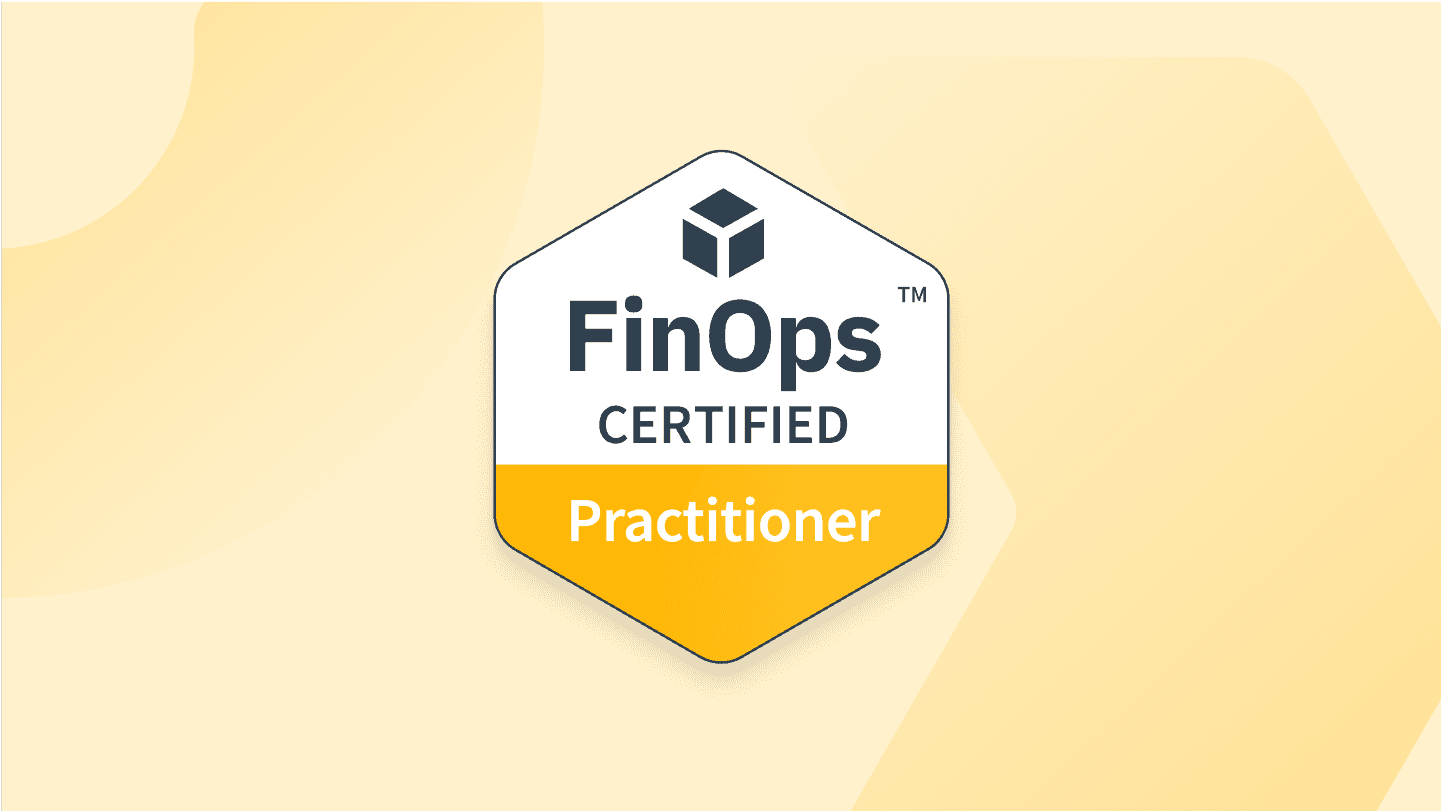
This is the entry-level certification from the FinOps Foundation. It's designed for individuals who are new to FinOps or cloud financial operations.
Who It’s For:
Engineers, finance professionals, or operations staff new to cloud cost management.
Teams starting their FinOps journey.
What It Covers:
FinOps principles and core concepts.
The three phases of FinOps: Inform, Optimize, and Operate.
Cost allocation, shared responsibility, and basic reporting.
Exam Format:
50 multiple-choice questions, 60-minute time limit.
Open-book, online exam.
This certification is ideal for establishing a common language across teams and introducing foundational FinOps thinking in your organization.
2. FinOps Certified Engineer
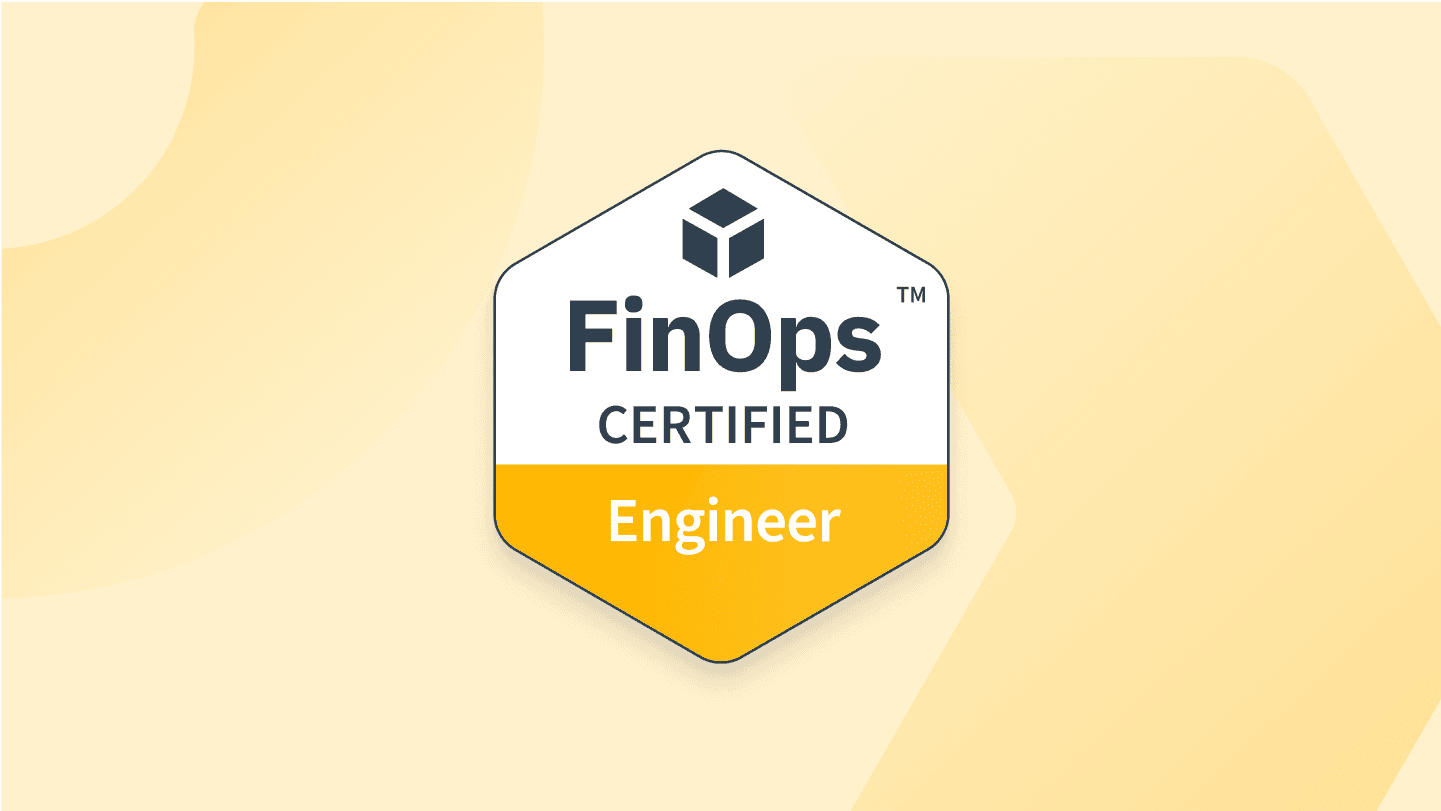
This certification is technical in nature, built for cloud and platform engineers who work directly with cloud infrastructure and automation.
Who It’s For:
Engineers manage tagging, scaling, provisioning, and cost-related automation.
DevOps and SRE teams.
What It Covers:
Resource optimization, automation, and policy enforcement.
Integration of FinOps into CI/CD pipelines.
Working with tools like AWS Budgets, GCP Billing, Azure Cost Management, etc.
This certification strengthens the connection between engineering actions and cost outcomes, helping engineers become active contributors to cloud financial goals.
3. FinOps Certified Professional
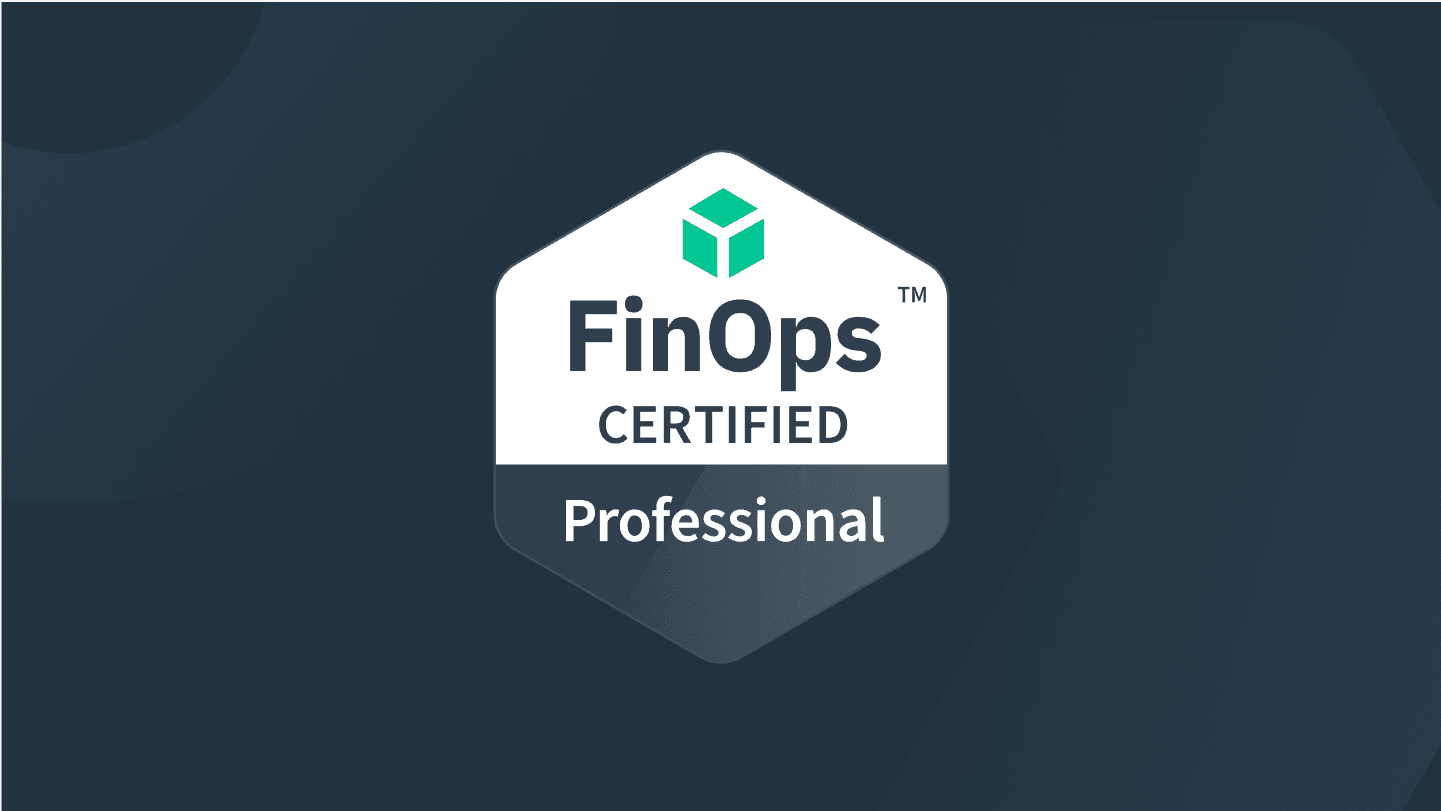
This is the advanced certification aimed at senior professionals who lead FinOps practices within organizations.
Who It’s For:
FinOps team leads, cloud financial strategists, and consultants.
Professionals driving cost strategy and enterprise-wide FinOps adoption.
What It Covers:
Advanced budgeting, forecasting, and unit economics.
Governance frameworks, stakeholder management, and KPI tracking.
Multi-cloud strategy and FinOps maturity models.
This certification focuses on strategy, leadership, and enterprise-level implementation, ideal for those building or scaling formal FinOps programs.
4. FinOps for Containers
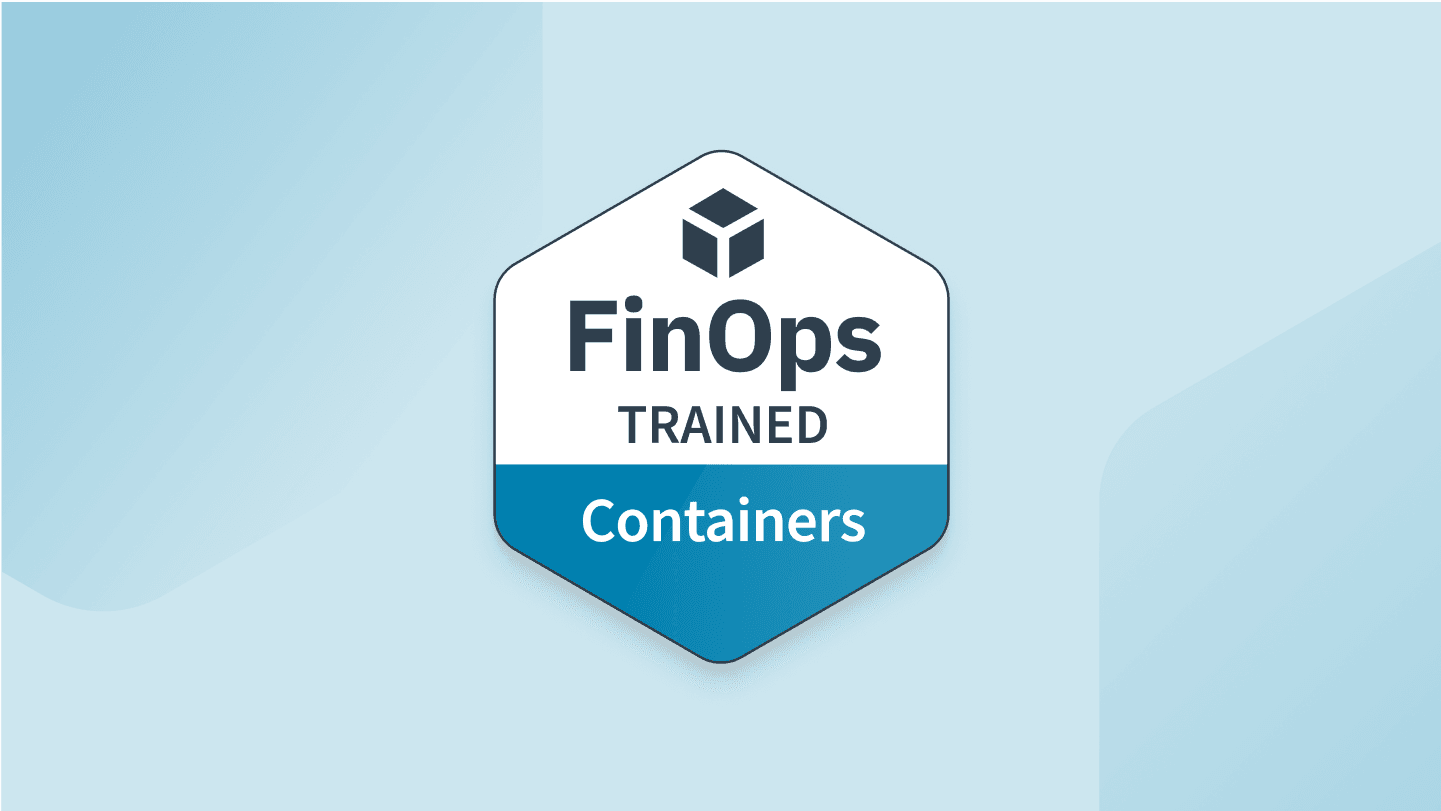
Containers, especially Kubernetes-based platforms, present unique cost-tracking challenges. This certification addresses how to apply FinOps in containerized environments.
Who It’s For:
Platform engineers, DevOps teams, and cloud architects.
Teams running workloads in Kubernetes, EKS, GKE, or AKS.
What It Covers:
Cost allocation in dynamic, container-based systems.
Managing shared resources and non-linear scaling.
Tooling for Kubernetes cost visibility (e.g., Kubecost, OpenCost).
This certification is essential for organizations running cloud-native, microservices-driven architectures where traditional cost tracking does not apply.
5. FinOps Personas – Finance Training

This certification is aimed at finance professionals working with cloud teams. It helps finance departments understand how cloud spending works and how to support FinOps efforts.
Who It’s For:
Finance analysts, controllers, and business operations leaders.
Anyone responsible for cloud budgeting, forecasting, or reporting.
What It Covers:
Cloud billing basics, pricing models, and unit cost analysis.
Communication frameworks for working with engineering teams.
Understanding FinOps KPIs and value tracking.
That said, it builds a common understanding between finance and cloud teams, enabling better collaboration and financial control.
6. FinOps Certified FOCUS Analyst
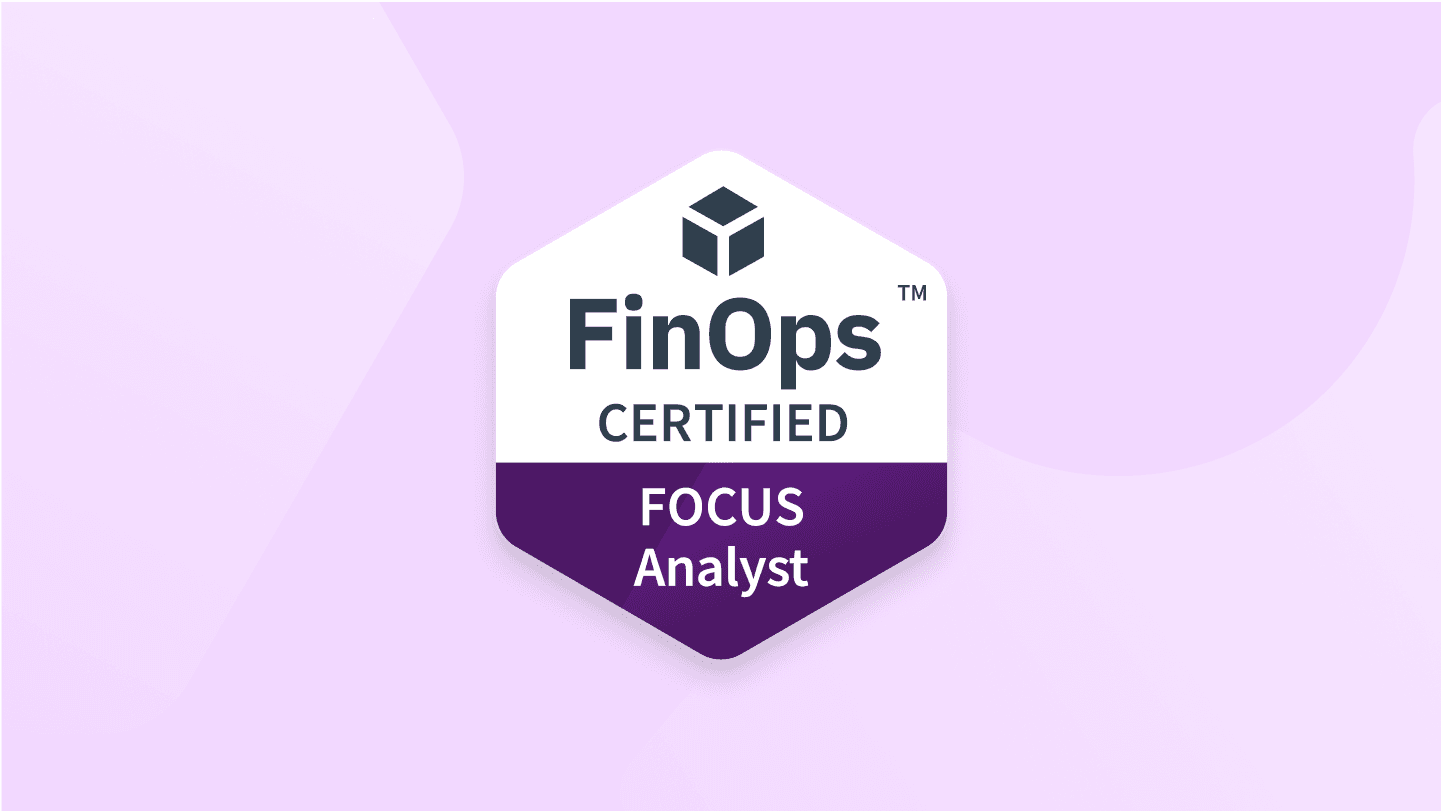
Started by FinOps Foundation and now approved by all big CSPs, FinOps Focus certification is built around the FinOps Open Cost and Usage Specification (FOCUS) standard—a shared model for cloud billing and usage data.
Who It’s For:
Analysts, BI teams, and FinOps practitioners are working with raw cloud cost data.
Professionals are responsible for building dashboards, reports, and usage metrics.
What It Covers:
The structure and purpose of FOCUS.
Parsing and analyzing billing data across AWS, Azure, and GCP.
Driving cost insights and actionable recommendations.
FOCUS certification is ideal for teams building internal reporting tools or integrating cost data into analytics platforms.
Resources to Prepare for FinOps Certification Exams
Preparing for a FinOps certification requires more than just reading a glossary. Each certification focuses on real-world practices, so you’ll need to understand how to apply FinOps concepts in dynamic cloud environments. Below are the most effective resources to help you prepare, whether you're aiming for foundational knowledge or advanced technical expertise.
1. Official FinOps Foundation Training
The FinOps Foundation provides official training programs for each of its certifications. These courses are aligned with the exam content and updated regularly.
FinOps Certified Practitioner Course: A self-paced online course with video lessons, quizzes, and interactive scenarios.
Engineer and Professional Paths: Instructor-led workshops and technical deep dives.
Finance Personas Course: Training tailored for finance roles with a focus on cloud budgeting and forecasting.
These resources are highly recommended for first-time candidates as they reflect the exact scope and exam format.
2. FinOps Foundation Documentation and Framework

The FinOps Framework is publicly available and serves as the foundation for all certifications. It includes:
Core principles
Lifecycle phases: Inform, Optimize, Operate
Maturity models
Personas and role-based practices
Studying this framework helps you understand how FinOps operates across organizations. Also, it’s a good way to learn the language and structure expected in the exams.
3. Practice Exams and Community Feedback
Several third-party platforms and FinOps community members share practice exams, quizzes, and exam tips. While unofficial, these resources help reinforce learning and test your understanding under time constraints.
Look for:
FinOps Foundation Slack group discussions
Study threads and insights from recent test-takers
Sample exam walkthroughs and peer-led reviews
Community feedback is especially helpful for identifying which areas are most emphasized on the actual exam.
4. Tools-Based Learning: AWS, Azure, GCP
Hands-on familiarity with cloud billing and cost tools is key. If you're preparing for technical certifications like Engineer or Containers, try working directly with:
AWS Cost Explorer, Budgets, and Savings Plans
Azure Cost Management and Reservations
Google Cloud Billing Reports and Cost Tables
Even the Practitioner exam expects you to recognize how these tools are used in real scenarios. Hands-on practice reinforces theory and builds confidence.
5. FinOps Books, Blogs, and Webinars
To go beyond the syllabus, explore real-world examples and case studies. The FinOps blogs and webinars often highlight:
Case studies from companies applying FinOps
Interviews with certified practitioners
New tooling and vendor ecosystem insights
For structured reading, check out:
Cloud FinOps by J.R. Storment and Mike Fuller (co-founders of the FinOps Foundation)
FinOps Foundation whitepapers and case documents
This helps contextualize the concepts and prepares you for scenario-based questions.
6. Team-Based Learning and Internal Practice
If you're part of an organization starting FinOps, prepare by working on internal FinOps tasks:
Create a sample cost allocation model
Build a dashboard showing cloud usage by team
Identify underutilized resources and suggest optimization steps
Applying the concepts in a real or sandbox environment is often the best form of preparation, especially for roles aiming to implement FinOps post-certification.
Why Pursue a FinOps Certification?
FinOps is now a key function in organizations running large-scale cloud environments. Getting certified in FinOps is more than a resume boost—it helps individuals and teams build trust, improve results, and align faster on cloud cost goals. Below are the major benefits of earning a FinOps certification.
Boost Career Opportunities in a High-Demand Field
The demand for cloud financial skills is growing. More companies need professionals who can manage cloud budgets, reduce waste, and improve cost efficiency.
A FinOps certification helps you stand out in roles such as:
Cloud Financial Analyst
FinOps Practitioner
Cloud Cost Optimization Engineer
Cloud Architect with FinOps focus
It signals that you understand both the technical and financial sides of cloud usage, which is rare and valuable in today’s job market.
Build Cross-Functional Credibility
FinOps is a team sport. It requires collaboration between engineering, finance, operations, and product. A certification proves that you can speak the language of each team.
When you hold a FinOps certification, stakeholders trust that you understand the impact of cloud usage, billing, and cost accountability. This helps build stronger alignment between technical and financial teams.
Strengthen Real-World Cloud Cost Management Skills
FinOps training is not theory-heavy. It focuses on practical knowledge—how to track usage, optimize resources, forecast budgets, and improve cloud ROI.
With certification, you gain a structured way of working that follows industry best practices. These skills help you drive savings without disrupting operations.
Help Your Organization Operate More Efficiently
Certified FinOps professionals improve visibility, reduce waste, and increase financial discipline across teams.
Of course, this leads to more predictable spending, better budget planning, and faster decision-making. Businesses can scale cloud usage with confidence, knowing someone is watching the cost-impact closely.
Stay Current with FinOps Standards and Tools
The FinOps Foundation keeps its certification programs updated. They reflect the latest trends in multi-cloud environments, pricing models, and FinOps tooling.
By staying certified, you stay aligned with how real teams are applying FinOps today—whether it’s managing containers, using AI to predict spend, or refining KPIs across departments.
Conclusion
FinOps has shifted from being a niche concept to a critical discipline in modern cloud operations. Certification is how professionals turn that discipline into action. It shows that you understand cloud financial principles and apply them in real environments—across teams, tools, and providers.
The certifications listed above offer clear learning paths, whether you're improving daily cost control, leading FinOps strategy, or supporting financial planning across cloud teams. Each one helps sharpen decision-making and build stronger alignment across engineering and finance.
Ready to Turn FinOps Knowledge Into Real Cloud Savings?

Learning FinOps is step one. Applying it effectively is step two. Cloudidr helps FinOps teams achieve instant, no-risk cloud compute savings—up to 40%—with no contracts, no code changes, and no commitment. We deliver the savings directly into your AWS, Azure, or GCP account. No lock-ins. No complexity. Just results. Drop us a hello!
Cloud spending is now one of the largest operating costs in digital businesses. Managing it requires more than just tools—it demands people with the right skills. This is where FinOps comes in.
FinOps, short for Cloud Financial Operations, is a growing practice. 76% of companies announced enormous investments in FinOps coaching for engineers. It brings finance, engineering, and operations teams together to manage cloud costs. As more companies adopt FinOps, certification is becoming a way to prove you understand the core principles and can apply them in real-world environments.
This guide explains what FinOps certifications are, why they matter, and which ones you can choose from. Even if you're a cloud engineer, a finance analyst, or part of a FinOps team, this post will help you find the right path to boost your skills and career.
What Are FinOps Certifications?
A FinOps certification shows that you understand how cloud costs work and how to manage them effectively. These certifications are offered by the FinOps Foundation, the leading organization in cloud financial operations.
FinOps roles are not limited to one department. Engineers, finance professionals, product managers, and cloud architects all play a part. A certification helps each team grasp how their work affects cloud spending.
These credentials cover key FinOps topics like:
Real-time cost visibility
Forecasting and budgeting
Cost allocation and tagging
Cloud usage optimization
Governance and policy enforcement
FinOps certifications follow the framework promoted by the FinOps Foundation, which includes principles, phases (Inform, Optimize, Operate), and defined roles. Getting certified means you're aligned with a standard many companies now use to guide cloud cost management.
Top FinOps Certifications to Explore
There are several FinOps certifications available for different roles and experience levels. Even if you're just starting or managing a mature FinOps function, there is a certification that matches your focus. Below is a breakdown of the six most recognized FinOps certifications and what they offer.
1. FinOps Certified Practitioner

This is the entry-level certification from the FinOps Foundation. It's designed for individuals who are new to FinOps or cloud financial operations.
Who It’s For:
Engineers, finance professionals, or operations staff new to cloud cost management.
Teams starting their FinOps journey.
What It Covers:
FinOps principles and core concepts.
The three phases of FinOps: Inform, Optimize, and Operate.
Cost allocation, shared responsibility, and basic reporting.
Exam Format:
50 multiple-choice questions, 60-minute time limit.
Open-book, online exam.
This certification is ideal for establishing a common language across teams and introducing foundational FinOps thinking in your organization.
2. FinOps Certified Engineer

This certification is technical in nature, built for cloud and platform engineers who work directly with cloud infrastructure and automation.
Who It’s For:
Engineers manage tagging, scaling, provisioning, and cost-related automation.
DevOps and SRE teams.
What It Covers:
Resource optimization, automation, and policy enforcement.
Integration of FinOps into CI/CD pipelines.
Working with tools like AWS Budgets, GCP Billing, Azure Cost Management, etc.
This certification strengthens the connection between engineering actions and cost outcomes, helping engineers become active contributors to cloud financial goals.
3. FinOps Certified Professional

This is the advanced certification aimed at senior professionals who lead FinOps practices within organizations.
Who It’s For:
FinOps team leads, cloud financial strategists, and consultants.
Professionals driving cost strategy and enterprise-wide FinOps adoption.
What It Covers:
Advanced budgeting, forecasting, and unit economics.
Governance frameworks, stakeholder management, and KPI tracking.
Multi-cloud strategy and FinOps maturity models.
This certification focuses on strategy, leadership, and enterprise-level implementation, ideal for those building or scaling formal FinOps programs.
4. FinOps for Containers

Containers, especially Kubernetes-based platforms, present unique cost-tracking challenges. This certification addresses how to apply FinOps in containerized environments.
Who It’s For:
Platform engineers, DevOps teams, and cloud architects.
Teams running workloads in Kubernetes, EKS, GKE, or AKS.
What It Covers:
Cost allocation in dynamic, container-based systems.
Managing shared resources and non-linear scaling.
Tooling for Kubernetes cost visibility (e.g., Kubecost, OpenCost).
This certification is essential for organizations running cloud-native, microservices-driven architectures where traditional cost tracking does not apply.
5. FinOps Personas – Finance Training

This certification is aimed at finance professionals working with cloud teams. It helps finance departments understand how cloud spending works and how to support FinOps efforts.
Who It’s For:
Finance analysts, controllers, and business operations leaders.
Anyone responsible for cloud budgeting, forecasting, or reporting.
What It Covers:
Cloud billing basics, pricing models, and unit cost analysis.
Communication frameworks for working with engineering teams.
Understanding FinOps KPIs and value tracking.
That said, it builds a common understanding between finance and cloud teams, enabling better collaboration and financial control.
6. FinOps Certified FOCUS Analyst

Started by FinOps Foundation and now approved by all big CSPs, FinOps Focus certification is built around the FinOps Open Cost and Usage Specification (FOCUS) standard—a shared model for cloud billing and usage data.
Who It’s For:
Analysts, BI teams, and FinOps practitioners are working with raw cloud cost data.
Professionals are responsible for building dashboards, reports, and usage metrics.
What It Covers:
The structure and purpose of FOCUS.
Parsing and analyzing billing data across AWS, Azure, and GCP.
Driving cost insights and actionable recommendations.
FOCUS certification is ideal for teams building internal reporting tools or integrating cost data into analytics platforms.
Resources to Prepare for FinOps Certification Exams
Preparing for a FinOps certification requires more than just reading a glossary. Each certification focuses on real-world practices, so you’ll need to understand how to apply FinOps concepts in dynamic cloud environments. Below are the most effective resources to help you prepare, whether you're aiming for foundational knowledge or advanced technical expertise.
1. Official FinOps Foundation Training
The FinOps Foundation provides official training programs for each of its certifications. These courses are aligned with the exam content and updated regularly.
FinOps Certified Practitioner Course: A self-paced online course with video lessons, quizzes, and interactive scenarios.
Engineer and Professional Paths: Instructor-led workshops and technical deep dives.
Finance Personas Course: Training tailored for finance roles with a focus on cloud budgeting and forecasting.
These resources are highly recommended for first-time candidates as they reflect the exact scope and exam format.
2. FinOps Foundation Documentation and Framework

The FinOps Framework is publicly available and serves as the foundation for all certifications. It includes:
Core principles
Lifecycle phases: Inform, Optimize, Operate
Maturity models
Personas and role-based practices
Studying this framework helps you understand how FinOps operates across organizations. Also, it’s a good way to learn the language and structure expected in the exams.
3. Practice Exams and Community Feedback
Several third-party platforms and FinOps community members share practice exams, quizzes, and exam tips. While unofficial, these resources help reinforce learning and test your understanding under time constraints.
Look for:
FinOps Foundation Slack group discussions
Study threads and insights from recent test-takers
Sample exam walkthroughs and peer-led reviews
Community feedback is especially helpful for identifying which areas are most emphasized on the actual exam.
4. Tools-Based Learning: AWS, Azure, GCP
Hands-on familiarity with cloud billing and cost tools is key. If you're preparing for technical certifications like Engineer or Containers, try working directly with:
AWS Cost Explorer, Budgets, and Savings Plans
Azure Cost Management and Reservations
Google Cloud Billing Reports and Cost Tables
Even the Practitioner exam expects you to recognize how these tools are used in real scenarios. Hands-on practice reinforces theory and builds confidence.
5. FinOps Books, Blogs, and Webinars
To go beyond the syllabus, explore real-world examples and case studies. The FinOps blogs and webinars often highlight:
Case studies from companies applying FinOps
Interviews with certified practitioners
New tooling and vendor ecosystem insights
For structured reading, check out:
Cloud FinOps by J.R. Storment and Mike Fuller (co-founders of the FinOps Foundation)
FinOps Foundation whitepapers and case documents
This helps contextualize the concepts and prepares you for scenario-based questions.
6. Team-Based Learning and Internal Practice
If you're part of an organization starting FinOps, prepare by working on internal FinOps tasks:
Create a sample cost allocation model
Build a dashboard showing cloud usage by team
Identify underutilized resources and suggest optimization steps
Applying the concepts in a real or sandbox environment is often the best form of preparation, especially for roles aiming to implement FinOps post-certification.
Why Pursue a FinOps Certification?
FinOps is now a key function in organizations running large-scale cloud environments. Getting certified in FinOps is more than a resume boost—it helps individuals and teams build trust, improve results, and align faster on cloud cost goals. Below are the major benefits of earning a FinOps certification.
Boost Career Opportunities in a High-Demand Field
The demand for cloud financial skills is growing. More companies need professionals who can manage cloud budgets, reduce waste, and improve cost efficiency.
A FinOps certification helps you stand out in roles such as:
Cloud Financial Analyst
FinOps Practitioner
Cloud Cost Optimization Engineer
Cloud Architect with FinOps focus
It signals that you understand both the technical and financial sides of cloud usage, which is rare and valuable in today’s job market.
Build Cross-Functional Credibility
FinOps is a team sport. It requires collaboration between engineering, finance, operations, and product. A certification proves that you can speak the language of each team.
When you hold a FinOps certification, stakeholders trust that you understand the impact of cloud usage, billing, and cost accountability. This helps build stronger alignment between technical and financial teams.
Strengthen Real-World Cloud Cost Management Skills
FinOps training is not theory-heavy. It focuses on practical knowledge—how to track usage, optimize resources, forecast budgets, and improve cloud ROI.
With certification, you gain a structured way of working that follows industry best practices. These skills help you drive savings without disrupting operations.
Help Your Organization Operate More Efficiently
Certified FinOps professionals improve visibility, reduce waste, and increase financial discipline across teams.
Of course, this leads to more predictable spending, better budget planning, and faster decision-making. Businesses can scale cloud usage with confidence, knowing someone is watching the cost-impact closely.
Stay Current with FinOps Standards and Tools
The FinOps Foundation keeps its certification programs updated. They reflect the latest trends in multi-cloud environments, pricing models, and FinOps tooling.
By staying certified, you stay aligned with how real teams are applying FinOps today—whether it’s managing containers, using AI to predict spend, or refining KPIs across departments.
Conclusion
FinOps has shifted from being a niche concept to a critical discipline in modern cloud operations. Certification is how professionals turn that discipline into action. It shows that you understand cloud financial principles and apply them in real environments—across teams, tools, and providers.
The certifications listed above offer clear learning paths, whether you're improving daily cost control, leading FinOps strategy, or supporting financial planning across cloud teams. Each one helps sharpen decision-making and build stronger alignment across engineering and finance.
Ready to Turn FinOps Knowledge Into Real Cloud Savings?

Learning FinOps is step one. Applying it effectively is step two. Cloudidr helps FinOps teams achieve instant, no-risk cloud compute savings—up to 40%—with no contracts, no code changes, and no commitment. We deliver the savings directly into your AWS, Azure, or GCP account. No lock-ins. No complexity. Just results. Drop us a hello!
Explore More from Cloudidr ...
Explore More from Cloudidr ...
Explore More from Cloudidr ...
Explore More from Cloudidr ...




The Memory Architecture of AI: From Context Windows to Infinite Agent Memory
The Memory Architecture of AI: From Context Windows to Infinite Agent Memory




Complete LLM Pricing Comparison 2026: We Analyzed 60+ Models So You Don't Have To
Complete LLM Pricing Comparison 2026: We Analyzed 60+ Models So You Don't Have To




Mistral 7B Instruct: Enterprise-Grade AI at Indie Hacker Prices
Mistral 7B Instruct: Enterprise-Grade AI at Indie Hacker Prices
Load More
Load More
Load More
Load More






